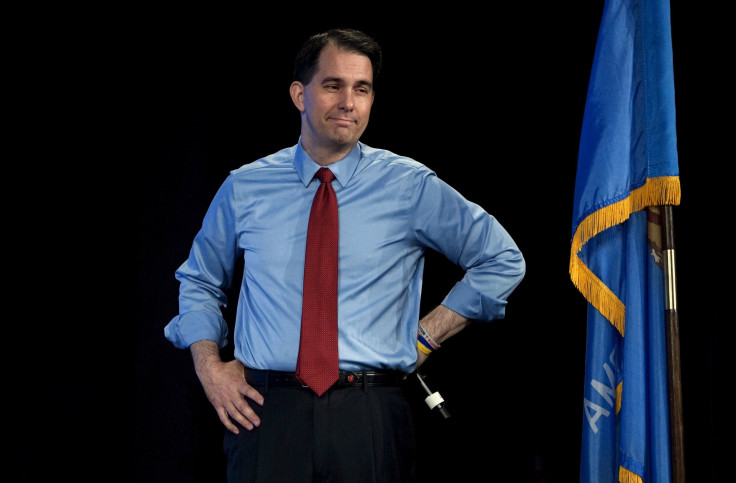Scott Walker Abortion Politics Aren't Unique, But Help Build National GOP Credentials

A bill making its way through the Wisconsin Legislature could provide Gov. Scott Walker with the perfect chance to check off another line on his presidential hopeful to-do list. Anti-union? Check. Fiscal conservative? Check. Pro-life? Give the man a pen, again.
The likely Republican presidential candidate made news last week when, in an interview on the Dana Show, he recalled a 2013 mandatory ultrasound law he signed, describing ultrasounds as “a pretty cool thing.” Separately, a new bill in Wisconsin would limit abortions to 20 weeks, with no exception for cases involving rape or incest, and Walker’s Madison office confirmed he would sign it if it lands on his desk.
Walker’s stance on abortion isn’t particularly surprising, but his opposition to exceptions for rape or incest comes across as particularly conservative on the anti-abortion spectrum, pro-abortion and political experts said. Put another way, the decision looks like Walker is just adding to a list of credentials that make him an increasingly attractive candidate to the types of conservatives he will need to woo in primary elections. And he is doing a solid job of it so far.
“Early in the race -- now -- you have candidates wanting to signal to different parts of the Republican Party” that they have certain conservative policy positions, said Jill Greenlee, associate professor of politics and women’s gender and sexuality studies at Brandeis University in Massachusetts. “Scott Walker is; he’s not a big name. He doesn’t have a profile like Jeb Bush, so he’s probably signaling to the far right of the party that he’s anti-abortion through and through.”
Walker, who is known for dropping out of college and making his way up the political ladder to become governor in 2010, isn’t alone on his anti-abortion stance. Former Sen. Rick Santorum, who officially joined the 2016 race this week, is known for his firm anti-abortion position. Other candidates, such as former Arkansas Gov. Mike Huckabee and U.S. Sens. Ted Cruz and Rand Paul have also staked out conservative positions on abortion.
So, in a crowded Republican field where virtually every one of his opponents are pro-life, what makes Walker stand out?
“I think the only thing that’s different about Walker is that it’s Wisconsin, and Wisconsin’s not Louisiana, Wisconsin’s not Mississippi,” said Joshua Wilson, an assistant professor of political science at the University of Denver and author of The Street Politics of Abortion. “Wisconsin is [not an overwhelmingly conservative state]. Wisconsin is a purple state.”
Walker drew national attention in the past when he got into a political brawl with Wisconsin’s public union collective bargaining rights. He faced a recall for it in 2011 and won, then won re-election after that. And in March, Wisconsin unions took another, deeper hit when he approved legislation that bars unions from collecting mandatory representation fees.
Walker has also cut education funding in his state. He is opposed to marijuana legalization. He has said marriage is defined as between one man and one woman, and he thinks states should decide what to do about it, not the federal government. He’s also said that abolishing federal income tax sounds tempting.
His hard work seems to be paying off and he’s doing pretty well in the polls, considering he’s not a Bush, a national office holder, or a second-run presidential candidate. In some of the most national recent polling, he’s up at the top with the likes of Bush, Sen. Marco Rubio, and Huckabee, among others.
“It’s kind of this mixed bag. Most people care about the economy primarily, but if you raise an issue like [abortion], they’re going to be interested and they’re going to be engaged and they probably have a strong opinion about it,” said Kelly Dittmar, a scholar at the Center for American Women in Politics at Rutgers University in New Jersey.
© Copyright IBTimes 2024. All rights reserved.





















